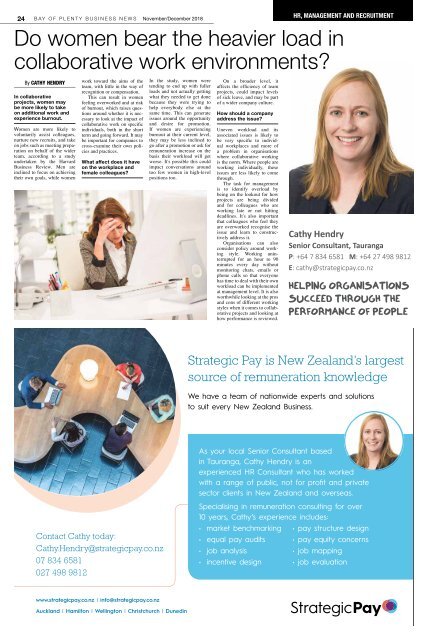Bay of Plenty Business News November/December 2018
From mid-2016 Bay of Plenty businesses have a new voice, Bay of Plenty Business News. This new publication reflects the region’s growth and importance as part of the wider central North Island economy.
From mid-2016 Bay of Plenty businesses have a new voice, Bay of Plenty Business News. This new publication reflects the region’s growth and importance as part of the wider central North Island economy.
Create successful ePaper yourself
Turn your PDF publications into a flip-book with our unique Google optimized e-Paper software.
24 BAY OF PLENTY BUSINESS NEWS <strong>November</strong>/<strong>December</strong> <strong>2018</strong><br />
HR, MANAGEMENT AND RECRUITMENT<br />
Do women bear the heavier load in<br />
collaborative work environments?<br />
By CATHY HENDRY<br />
In collaborative<br />
projects, women may<br />
be more likely to take<br />
on additional work and<br />
experience burnout.<br />
Women are more likely to<br />
voluntarily assist colleagues,<br />
nurture new recruits, and take<br />
on jobs such as meeting preparation<br />
on behalf <strong>of</strong> the wider<br />
team, according to a study<br />
undertaken by the Harvard<br />
<strong>Business</strong> Review. Men are<br />
inclined to focus on achieving<br />
their own goals, while women<br />
work toward the aims <strong>of</strong> the<br />
team, with little in the way <strong>of</strong><br />
recognition or compensation.<br />
This can result in women<br />
feeling overworked and at risk<br />
<strong>of</strong> burnout, which raises questions<br />
around whether it is necessary<br />
to look at the impact <strong>of</strong><br />
collaborative work on specific<br />
individuals, both in the short<br />
term and going forward. It may<br />
be important for companies to<br />
cross-examine their own policies<br />
and practices.<br />
What affect does it have<br />
on the workplace and<br />
female colleagues?<br />
In the study, women were<br />
tending to end up with fuller<br />
loads and not actually getting<br />
what they needed to get done<br />
because they were trying to<br />
help everybody else at the<br />
same time. This can generate<br />
issues around the opportunity<br />
and desire for promotion.<br />
If women are experiencing<br />
burnout at their current level,<br />
they may be less inclined to<br />
go after a promotion or ask for<br />
remuneration increase on the<br />
basis their workload will get<br />
worse. It's possible this could<br />
impact conversations around<br />
too few women in high-level<br />
positions too.<br />
On a broader level, it<br />
affects the efficiency <strong>of</strong> team<br />
projects, could impact levels<br />
<strong>of</strong> sick leave, and may be part<br />
<strong>of</strong> a wider company culture.<br />
How should a company<br />
address the issue?<br />
Uneven workload and its<br />
associated issues is likely to<br />
be very specific to individual<br />
workplaces and more <strong>of</strong><br />
a problem in organisations<br />
where collaborative working<br />
is the norm. Where people are<br />
working individually, these<br />
issues are less likely to come<br />
through.<br />
The task for management<br />
is to identify overload by<br />
being on the lookout for how<br />
projects are being divided<br />
and for colleagues who are<br />
working late or not hitting<br />
deadlines. It's also important<br />
that colleagues who feel they<br />
are overworked recognise the<br />
issue and learn to constructively<br />
address it.<br />
Organisations can also<br />
consider policy around working<br />
style. Working uninterrupted<br />
for an hour to 90<br />
minutes every day without<br />
monitoring chats, emails or<br />
phone calls so that everyone<br />
has time to deal with their own<br />
workload can be implemented<br />
at management level. It is also<br />
worthwhile looking at the pros<br />
and cons <strong>of</strong> different working<br />
styles when it comes to collaborative<br />
projects and looking at<br />
how performance is reviewed.<br />
Cathy Hendry<br />
Senior Consultant, Tauranga<br />
P: +64 7 834 6581 M: +64 27 498 9812<br />
E: cathy@strategicpay.co.nz<br />
HELPING ORGANISATIONS<br />
SUCCEED THROUGH THE<br />
PERFORMANCE OF PEOPLE<br />
Strategic Pay is New Zealand’s largest<br />
source <strong>of</strong> remuneration knowledge<br />
We have a team <strong>of</strong> nationwide experts and solutions<br />
to suit every New Zealand <strong>Business</strong>.<br />
As your local Senior Consultant based<br />
in Tauranga, Cathy Hendry is an<br />
experienced HR Consultant who has worked<br />
with a range <strong>of</strong> public, not for pr<strong>of</strong>i t and private<br />
sector clients in New Zealand and overseas.<br />
Contact Cathy today:<br />
Cathy.Hendry@strategicpay.co.nz<br />
07 834 6581<br />
027 498 9812<br />
Specialising in remuneration consulting for over<br />
10 years, Cathy’s experience includes:<br />
• market benchmarking<br />
• equal pay audits<br />
• job analysis<br />
• incentive design<br />
• pay structure design<br />
• pay equity concerns<br />
• job mapping<br />
• job evaluation<br />
www.strategicpay.co.nz | info@strategicpay.co.nz<br />
Auckland | Hamilton | Wellington | Christchurch | Dunedin<br />
StrategicPay


















